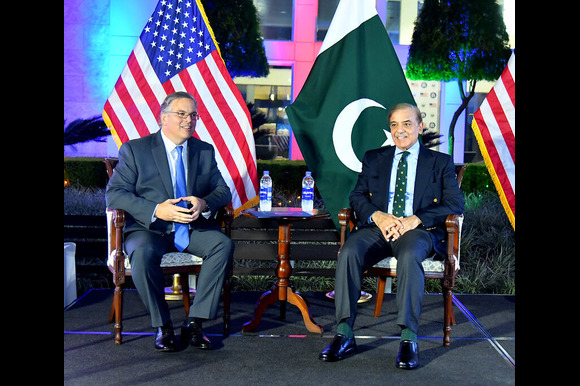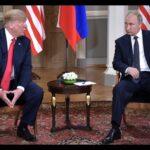Pakistan and the United States finalised a long-awaited trade agreement on Wednesday night, just hours before a looming 1 August deadline that could have triggered significant tariff hikes. While specific figures regarding the tariff reductions were not disclosed, US President Donald Trump confirmed the deal and highlighted a new partnership aimed at tapping into Pakistan’s substantial oil reserves.
Pakistani Finance Minister Muhammad Aurangzeb, currently in Washington to negotiate the trade pact, also began high-level discussions with senior US officials on Wednesday.
“In a landmark development, Pakistan and the United States finalised a trade agreement today aimed at boosting bilateral trade, expanding market access, attracting investment, and fostering cooperation in areas of mutual interest,” Pakistan’s embassy in the United States posted on X (formerly Twitter) early Thursday.
President Trump announced the agreement in a post on his social media platform, Truth Social, where he said, “We have just concluded a deal with the country of Pakistan, whereby Pakistan and the United States will work together on developing their massive oil reserves.”
He added, “We are in the process of choosing the oil company that will lead this partnership. Who knows, maybe they’ll be selling oil to India some day!”
Although no formal announcement was made about the final tariff rate, Pakistan’s embassy stated the agreement “will result in reduction of reciprocal tariff especially on Pakistani exports to the United States.”
The embassy further said, “This deal marks the beginning of a new era of economic collaboration, especially in energy, mines and mineral, IT, cryptocurrency, and other sectors.”
The agreement aims to broaden the scope of economic relations between the two nations, with a particular emphasis on partnerships at the US state level, mutual market access, and cross-border investments.
The deal was finalised during a meeting that included Finance Minister Aurangzeb, US Secretary of Commerce Howard Lutnick, US Trade Representative Ambassador Jamieson Greer, Pakistan’s Commerce Secretary Jawad Paul, and Pakistan’s Ambassador to the US, Rizwan Saeed Sheikh.
According to the Pakistani embassy, the agreement is expected to drive increased US investment in Pakistan’s infrastructure and development sectors.
“This trade agreement underscores the commitment of both nations to deepen their bilateral relationship and explore all avenues for strengthening trade and investment ties,” the embassy’s statement added.
Pakistani Prime Minister Shehbaz Sharif praised President Trump’s leadership in securing the agreement, writing on X, “This landmark deal will enhance our growing cooperation so as to expand the frontiers of our enduring partnership in days to come.”
Foreign Minister Ishaq Dar also confirmed the trade deal in a statement early Thursday, although he did not provide additional details. Meanwhile, Finance Minister Aurangzeb hailed the agreement as a “win-win” for both countries.
“Today marks the culmination of the journey we started a few months back,” Aurangzeb said in a video statement issued by Pakistan’s Ministry of Finance. He detailed the progress made during the tariff negotiations and underlined the efforts to address non-tariff barriers, correct trade imbalances, and review tariff lines on both sides.
“We had a very constructive final round of discussion, which then led to finalising the trade deal, which was later announced by President Trump,” he said.
Aurangzeb added that the negotiations were always about more than short-term gains. “From our perspective, it was always going beyond the immediate trade imperative. The whole point of this is that trade and investment have to go hand in hand,” he noted.
He also acknowledged the vital role of the private sector during the process, saying, “When we were trying to figure out how to reduce or end the trade imbalance, the private sector was the first constituent who came up and said they will help.”
The finance minister thanked Commerce Secretary Jawad Paul, Ambassador Sheikh, and their respective teams, adding, “Where we stand today is because of our teamwork.”
Echoing Trump’s earlier remarks, Aurangzeb reiterated that the agreement is a genuine “win-win situation for Pakistan and the United States.” He added, “We are in a good place today in Pakistan in terms of where we have arrived before August 1, and for that, I congratulate everyone.”
“We have come a long way from where we were to where we are today in terms of our overall strategic partnership between Pakistan and the US. It will, God willing, go from strength to strength as we go forward,” he concluded.
The deal comes amid Pakistan’s designation as a “major non-NATO ally” by Washington—a status aimed at strengthening regional ties and countering China’s influence. Earlier this year, the US had announced a possible 29% tariff on Pakistani exports, a move that was later suspended for 90 days to allow time for negotiations.
Last week, Foreign Minister Dar said both nations were “very close” to finalising a trade pact after meeting US Secretary of State Marco Rubio. Discussions during that meeting focused on critical minerals, mining, and expanding trade ties.
Pakistan has sent a number of high-level officials to Washington in recent weeks in a concerted effort to reach a deal before the August deadline.
According to the Office of the US Trade Representative, total goods trade between the US and Pakistan was approximately $7.3 billion in 2024, up from $6.9 billion in 2023. The US had a goods trade deficit of $3 billion with Pakistan this year, an increase of 5.2% over the previous year.
However, not everyone welcomed the deal.
Former Senate chairman Mian Raza Rabbani criticised the secrecy surrounding the agreement, saying, “It is a sad day for transparency and good governance when the people of Pakistan come to know through a tweet of the US President that an oil exploration deal has been finalised.”
Rabbani argued that such deals fall under Article 172 of the Pakistani Constitution, which grants provinces 50% ownership of land, minerals, and other natural resources.
He urged the federal government to immediately take Parliament into confidence regarding the US-Pakistan deal, saying, “It should call a meeting of the Council of Common Interests and take provinces into confidence on such and other projects.”






